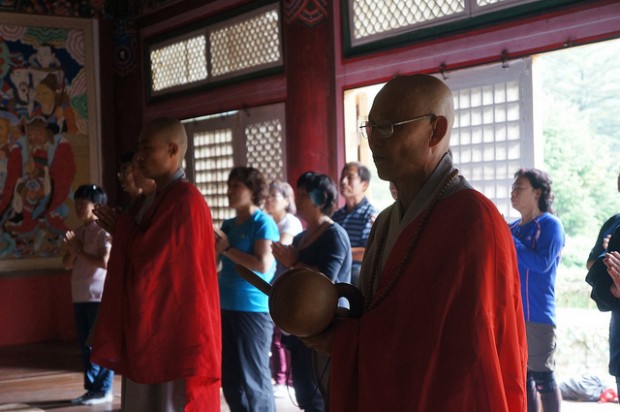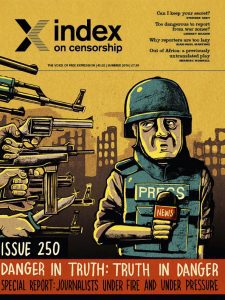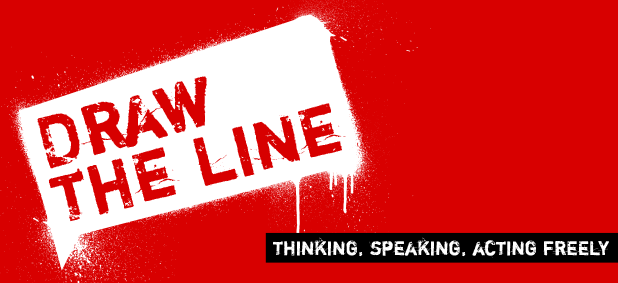14 Apr 2016 | Asia and Pacific, Burma, China, Eritrea, Europe and Central Asia, Iran, Middle East and North Africa, mobile, News and features, North Korea, Saudi Arabia, Sudan, Turkmenistan, Uzbekistan
[vc_row][vc_column][vc_column_text]

Pohyon Temple in the Myohyang mountains, once a national center for Korean Buddhism. Credit: Uri Tours / Flickr
After the United States Commission on International Religious Freedom, an independent organisation created by the US Congress to evaluate religious freedom conditions around the world, released its 2015 report, it became clear that an insufficient amount of progress had been made since Index on Censorship last reported on the issue.
Here’s a roundup of some the most appalling religious freedom violations from across the globe.
Burma
Bigotry and intolerance continue to scorch the lives of religious and ethnic minorities in Burma, particularly Rohingya Muslims. The Burmese government demonstrated little effort toward intervening or properly investigating claims of abuse, including those carried out by religious figures in the Buddhist community. As internet availability spread throughout the country, social media played a role in promoting a platform of hate and proposed violence against minority populations. Rohingya Muslims in the country face a unique level of discrimination and persecution. The government denies them citizenship and the right to identify as Rohingya. Additionally, four discriminatory race and religion bills could further the prejudices affecting religious minorities.
North Korea
North Korea is a nation where genuine freedom of religion or belief is non-existent; it remains one of the most oppressive regimes and worst violators of human rights. Punishment comes to those who pose difficult questions while the government maintains its control through a constant threat of imprisonment, torture and even death for those who break the law regarding religion. Estimates suggest up to 200,000 North Koreans are currently suffering in labor camps, tens of thousands of whom are there for practicing heir faith. In February 2014, the Commission of Inquiry on Human Rights in the Democratic People’s Republic of Korea released its report documenting the systematic, severe violations of human rights in the country. It found “an almost complete denial of the right to freedom of thought, conscience”.
Saudi Arabia
Officially an Islamic state with eight to ten million expatriate workers of different faiths, Saudi Arabia continues to restrict most forms of public religious expression inconsistent with its interpretation of Sunni Islam. The government continues to use criminal charges of blasphemy to suppress any dialogue between dissenting viewpoints, with a new law helping drive home the goal of silence. The Penal Law for Crimes of Terrorism and its Financing criminalises virtually all forms of peaceful dissent and free expression, including criticising the government’s view of Islam. Lastly, authorities continue to discriminate grossly against dissident clerics and members of the Shia community.
Sudan
The Sudanese government continues to engage in massive violations of freedom of religion, due to president Omar al-Bashir’s policies of Islamisation and restrictive interpretation of sharia law. Despite 97% of the population being Muslim, there is a wide range of other religions practiced. The country’s turmoil from religious persecution rests on the 1991 Criminal Code, the 1991 Personal Status Law of Muslims, and state-level “public order” laws, which have restricted freedom for all Sudanese. The laws – which contradict the country’s constitutional and international commitments to human rights and freedom of religion – allow death sentences for apostasy, stoning for adultery, cross-amputations for theft, prison sentences for blasphemy and floggings for undefined “offences of honor, reputation and public morality”. Since 2011, more than 170 people have been arrested and charged with apostasy.
Article continues below
[/vc_column_text][/vc_column][/vc_row][vc_row][vc_column][vc_custom_heading text=”Join the Index mailing list and get an exclusive gift” font_container=”tag:p|font_size:28|text_align:left” use_theme_fonts=”yes”][vc_separator color=”black”][/vc_column][/vc_row][vc_row][vc_column width=”1/2″][vc_column_text]

Index on Censorship’s summer magazine 2016
We’ll send you our weekly emails and periodic updates on our events. We won’t share your personal information with anyone outside Index.
You’ll also get access to an exclusive collection of articles from our landmark 250th issue of Index on Censorship magazine exploring journalists under fire and under pressure. Your downloadable PDF will include reports from Lindsey Hilsum, Laura Silvia Battaglia and Hazza Al-Adnan.[/vc_column_text][/vc_column][vc_column width=”1/2″][gravityform id=”20″ title=”false” description=”false” ajax=”false”][/vc_column][/vc_row][vc_row][vc_column][vc_separator color=”black”][/vc_column][/vc_row][vc_row][vc_column][vc_column_text]Uzbekistan
In Uzbekistan, the government imprisons individuals for not conforming to officially prescribed practices or whom it claims are extremist, including as many as 12,000 Muslims. A highly restrictive religion law is imposed, the 1998 Law on Freedom of Consciences and Religious Organisations, which severely limits the rights of all religious groups and facilitates Uzbek government control over religious activity. Many who don’t fit into the framework of officially approved practices are regularly repressed. Additionally, the government has continued a campaign against independent Muslims, targeting those linked to the May 2005 protests in Andijan; 231 are still imprisoned in connection to the events, and ten have died. All the while, Uzbekistan has pressured countries to return Uzbek refugees who fled during the Andijan tragedy.
Turkmenistan
In an environment of nearly inescapable government information control, severe religion freedom breaches persist in Turkmenistan. Continuing police raids and harassment of registered and unregistered religious groups matched with laws and policies that violate international human rights norms has the nation as one of the year’s biggest offenders. With an estimated total population of 5.1 million, the US government projects that the country is 85% Sunni Muslim, 9% Russian Orthodox, and a 2% total that includes Jehovah’s Witnesses, Jews, and evangelical Christians. Despite Turkmenistan’s constitutionally guaranteed religious freedom and separation of religion from the state, the 2003 religion law negates these provisions while setting intrusive registration criteria for individuals. It also requires that the government is informed of all foreign financial support, forbids worship in private homes and places discriminatory restrictions on religious education.
China
While the Chinese constitution guarantees freedom of religion, this idea really only applies to “normal religions”, better known as the five state-sanctioned “patriotic religious associations” associated with Buddhism, Taoism, Islam, Catholicism and Protestantism. Even still, the government monitors religious activities unfairly, and there has been an increased religious persecution of Uighur Muslims in the name of fighting terrorism. All around repression in China worsened in 2014, including the governmental push for controlling Tibet, Xinjiang, and even Hong Kong, as well as controls on the internet, social media, human rights defenders, activists and journalists.
Eritrea
Ongoing religious freedom abuses have continued in Eritrea, including torture or ill-treatment of religious prisoners, random arrests without charges and banning’s on public religious activities. The situation is especially serious for Evangelical and Pentecostal Christians and Jehovah’s Witnesses, and the government suppresses Muslim religious activities and those opposed to the government-appointed head of the community. In 2002, the government increased its control over religion by imposing a registration requirement on all religious groups other than the Coptic Orthodox Church of Eritrea, Sunni Islam, the Roman Catholic Church and the Evangelical Church of Eritrea. The requirements mandated that the non-preferred religious communities provide detailed information about their finances, membership, activities, and benefit to the country. Additionally, released religious prisoners have reported to USCIRF that they were confined in crowded conditions, and subjected to extreme temperature fluctuations. The government continued to arrest and detain followers of unregistered religious communities. Recent estimates suggest 1,200 to 3,000 people are imprisoned on religious grounds in Eritrea, the majority of whom are Evangelical or Pentecostal Christians.
Iran
Poor religious freedom in Iran continued to worsen in 2014, particularly for minority groups like Bahá’ís, Christian converts, and Sunni Muslims. The government is still engaging in systematic violations, including prolonged detention, torture, and executions based on the religion of the accused. Despite Christians, Jews, and Zoroastrians being recognised as protected minorities, the government has consistently discriminated against its citizens on the basis of religion. Killings, arrests, and physical abuse of detainees have increased in recent years, including for religious minorities and Muslims who are perceived as threatening the government’s legitimacy.[/vc_column_text][/vc_column][/vc_row][vc_row][vc_column][vc_basic_grid post_type=”post” max_items=”12″ style=”load-more” items_per_page=”4″ element_width=”6″ grid_id=”vc_gid:1493906845781-a7b9ac80-f77d-2″ taxonomies=”1742″][/vc_column][/vc_row]
21 Aug 2015 | Bosnia, mobile, News and features, Youth Board
This is the ninth of a series of posts written by members of Index on Censorship’s youth advisory board.
Members of the board were asked to write a blog discussing one free speech issue in their country. The resulting posts exhibit a range of challenges to freedom of expression globally, from UK crackdowns on speakers in universities, to Indian criminal defamation law, to the South African Film Board’s newly published guidelines.

Lejla Becar is a member of the Index youth advisory board. Learn more
In 2005, the chair of Visoko municipality cancelled a concert due to be performed by Skroz, a rock band from Bosnia and Herzegovina. He justified his decision by saying that the concert and the sponsor (a famous beer brand) would be insulting for Muslims and Muslim youth.
These decisions riled up both the organisers of the events and also citizens, both Muslim and non-Muslim. One of the main organisers was Adnan Jašo Jašarspahić, editor of independent radio station Radio Q. He was to face consequences in the years to come due to his decision not to obey the chair and ignore the cancellation of the Skroz concert. It was held 15 days after cancellation.
This was not an isolated event. In 2006 Croatian band Let 3 were not allowed to perform in Travnik, a small municipality in central Bosnia. In 2008, Bosnian group Dubioza Kolektiv were banned from performing in Goražde. In the meantime, the Communications Regulatory Agency (CRA) penalised Bosnian radio station Radio 202 — fining them more than €5,000 — for playing hip-hop music on air. The agency stated it had been offensive.
The situation now? In my town, cultural events for youth are a phenomena. More and more young people are leaving, turning to radical Islam or simply living within an oppressive system without complaint. The people fighting the system were silenced. Ten years of violating the right to freedom of expression took its toll and now the government has succeeded in creating a society that is obedient, ignorant and passive.
Lejla Becar, Bosnia and Herzegovina
Related:
• Anastasia Vladimirova: A ruthless crackdown on independent media
• Simeon Gready: An over-the-top regulation policy
• Ravian Ruys: Without trust, free speech suffers
• Muira McCammon: GiTMO’s linguistic isolation
• Jade Jackman: An act against knowledge and thought
• Harsh Ghildiyal: Defamation is not a crime
• Tom Carter: No-platforming Nigel
• Matthew Brown: Spying on NGOs a step too far
• About the Index on Censorship youth advisory board
• Facebook discussion: no-platforming of speakers at universities
15 Dec 2014 | About Index, Draw the Line, Young Writers / Artists Programme

Religious freedom and religious radicalism which leads to extremism has become an increasingly difficult balancing act in the digital age where presenting religious superiority through fear and “terror” is possible both locally and internationally at internet speeds.
The ongoing series of beheading videos released by the Islamic State and the showcase of kidnapped school girls by Nigeria’s Boko Haram on YouTube are both examples that test the extent to which the UN Convention of Human Rights can protect religious freedoms. According to a report by the International Humanist and Ethical Union, Egypt’s Youth Ministry are targeting young atheists vocal on social media about the dangers of religion. In Saudi Arabia, Raef Badawi was sentenced to seven years in prison in 2013 and received 600 lashes for discussing other versions of Islam, besides Wahhabism, online.
Article 18 of the Convention states that the “right includes freedom to change his religion or belief, and freedom, either alone or in community with others and in public or private to manifest his religion or belief in teaching, practice, worship and observance”. The interpretation of “practice” is a grey area – especially when the idea of violence as a form of punishment can be understood differently across various cultures. Is it right to criticise societies operating under Sharia law that include amputation as punishment, ‘hadd’ offences that include theft, and stoning for committing adultery?
Religious extremism should not only be questioned under the categories of violence or social unrest. Earlier this month, religious preservation in India has led to the banning of a Bollywood film scene deemed ‘un-Islamic’ in values. The actress in question was from Pakistan, and sentenced to 26 years in prison for acting out a marriage scene depicting the Prophet Muhammad’s daughter. In Russia, the state has banned the publication of Jehovah’s Witness material as the views are considered extremist.
In an environment where religious freedom is tested under different laws and cultures, where do you draw the line on international grounds to foster positive forms of belief?
This article was posted on 15 December 2014 at indexoncensorship.org
13 May 2014 | News and features, Nigeria, Pakistan, Religion and Culture
More than three weeks after the abduction of over 200 schoolgirls from the northern Nigerian town of Chibok by Boko Haram (BH), an Islamist militant group, the world is finally awake to the tragedy.
While Michelle Obama tweeted a photo of herself displaying the hashtag #BringBackOurGirls, Angelina Jolie said she was “sickened” by the “unthinkable cruelty” and has expressed her anger.
“I heard about it just a few days back when a friend posted an article on Facebook. I was stunned beyond words,” said 19-year old college student Iqra Moazzam, in Karachi, who cannot get over the fact that the girls may have already been sold.
Last week, BH’s leader Abubakar Shekau, threatened to “sell [the girls] in the market” into slavery.
“Not only was the Muslim community slow to respond but the West was also slow to respond,” pointed out Aurangzeb Haneef, who teaches Islamic Studies at the Department of Humanities and Social Sciences at the Lahore University of Management Sciences. He said there was also some discussion on whether the response would have been quicker had the girls been white.
Boko Haram came about in 2009 in an attempt to impose Islamic law in all 36 Nigerian states. It has been behind killing of thousands of people in Nigeria in recent years and known to have links with other radical Islamist groups in North Africa and Sahel.
“I think they have defiled the name of Islam and added one more stain on the Muslim Ummah. I’m infuriated they are calling themselves Muslims; there is not a shred of Islam in their evil deed,” Moazzam said.
And yet surprisingly, there has been no word of condemnation from any religious institution, no indignation from the pulpit by imams during the weekly Friday sermons and no remonstration from the people in the Islamic world.
In September 2012, video-sharing website YouTube put up a 14-minute clip of Innocence of Muslims, produced by an American that was disrespectful of Islam, Muslims and the Prophet Muhammad, which sent a wave of protests throughout the Muslim world. In Pakistan, complete mayhem broke out: 30 people were killed and over 300 were injured.
The 12 cartoons published on 30 September 2005 by the Danish newspaper Jyllands-Posten of Prophet Muhammad, and which the Muslims found extremely and deliberately offensive, led to attempts on the life of the cartoonist and arson attempt made on the newspaper office.
Khalid Zaheer, an eminent religious scholar and vice-president of Al-Mawrid, a foundation for Islamic research and education, explained: “People come to the streets for issues about which they are sensitised by their scholars. Blasphemy is a topic that concerns the ulema (scholars) more because they have literature speaking against it.”
But he said: “Killing in the name of Islam is either considered an exaggerated propaganda, justified jihad, or atrocities done by some enemies who have conspired to malign Islam.” He said the narrow view of the world that is taught in madrassas and promoted in mosques causes non-issues to be made a matter of life and death and real issues to be ignored as if they don’t exist.
Haneef also attributed the inaction on the street to lack of response to the episode by the religious parties. He added: “Since the victims in this case are not Muslims (although some reports suggested that a few of them were Muslims) and since the accused here claim some kind of Islam, therefore, there has been understandable inertia on the part of Islamic parties to criticise BH.”
Unfortunately, pointed out Haneef: “Common Muslims are reluctant to take up issues involving atrocities against non-Muslims. Few people understand that these atrocities are in the name of Islam — Islam is being hurt here — yet they don’t feel compelled enough to raise their voice against BH.”
The same sentiment was endorsed by peace activist, Dr Pervez Hoodbhoy, who is also an academic. “I am sure that most Muslims do not approve of Muslims killing non-Muslims or other Muslims, but this does not raise passions in the same way.”
He also said: “Most Muslims today do disapprove of the mass abduction and sale of the Nigerian girls, but they prefer silence. There is vague discomfort that being too loud might cause Islamic fundamentals to come under scrutiny, something that is best avoided in these dangerous times.”
Hoodbhoy explained that with BH at war with those they consider infidels: “Women captured during tribal wars were part of the war booty and the Holy Quran is completely explicit on the distribution of every kind of booty, including women. Of course, as with slavery, most Muslims regard these verses as meant for those times only.” He said that was the takfiri (a Muslim who accuses another Muslim of apostasy) philosophy of the BH.
Khadeja Ebrahim 12, studying in Class 7, at a British school in Karachi likened the Nigerian militant group to the Tehreek-e-Taliban Pakistan (TTP). “They seem like the Taliban we have in Pakistan, who attacked Malala and believe those seeking western-style education are committing a sin,” she told Index. Asked if she felt scared she nodded saying: “If it can happen in Nigeria, it can happen here in Pakistan and in Karachi too.”
Still, Hoodbhoy, finds the Taliban quite gentle when compared to the BH. “While the TTP does mount suicide attacks, and makes video tapes football matches played with the heads of decapitated Pakistan soldiers, the techniques employed by BH are brutal beyond description.”
This article was updated at 11:46 on 13 May, 2014.
This article was posted on May 13, 2014 at indexoncensorship.org




